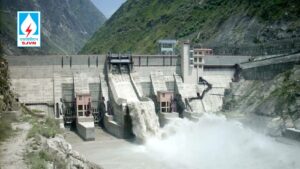Powering Growth
By IE&M Research
A unique example of a successful Public-Private Partnership and known for its transparent governance practices PTC India Limited was incorporated in 1999. A pioneer in starting a power market in India with long term trading of power generated from large power projects as well as short term trading arising as a result of supply and demand mismatches. Since July 2001, it has provided the best value to both the buyers and sellers while ensuring optimum utilization of resources. PTC has a client base covering all the state utilities of the country as well as some power utilities in the neighboring countries.
The installed capacity in India has increased from 1362 MW in 1947 to about 298 GW as on 31st March 2016. However, the inherent diversity in demand of various States and Regions in the country results in periods of seasonal surplus in one State or region coinciding with periods of deficit in another. This coexistence of overall shortages with complementary geographical and temporal surplus-deficits provides substantial opportunities to improve the economic efficiency and reliable supply through trading of power both within as well as across Regions. PTC has a tri-fold mandate: to optimally utilize the existing resources to develop a full fledged efficient and competitive power market, to attract private investment in the Indian power sector and to encourage trade of power with neighboring countries.
The company has two subsidiary companies namely – PTC India Financial Services (PFS) and PTC Energy Ltd. PFS has been promoted as NBFC and is structured as a ‘one-stop shop’ for financing of power projects over the project life cycle. PFS majorly provides financial assistance in the form of term debt or corporate debt instruments. Another subsidiary of PTC India Ltd company PTC Energy Ltd, has been set up with an objective to develop asset base taking into its sphere the business of generation, supply, distribution, transmission and dealing in all forms of energy, including import and export of coal, conversion of coal/ fuels into electricity, fuel linkages and provide advisory services in the energy sector and energy efficiency. The current CMD is associated with the company since 2003 and has played a key role in the formation of PTC India Financial Services Ltd. (PFS).
Financials
PTC India Ltd.’s revenue has moved up from Rs 11 Crores in FY 2000-01 to Rs 13149.36 Crores in FY 2014-15. During Q4FY16, PTC India reported a strong 55% YoY jump in traded volume at 9.8bn units. This is the highest quarterly growth in trailing 20 quarters, albeit on a low base (Q4FY15 was down 17%). While the share of short-term trade remained flat at 59%, share of long-term trades increased to 28%, YoY. Overall FY16 volumes grew 14% to 42.4bn units. While operationally it was a good quarter, receivables increased, thus deteriorating the overall working capital and thereby leading to lower cash levels compared to the last fiscal. A long-term volumes surge was due to different reasons. PTC’s subsidiary, PTC Energy, also commissioned its 50MW wind capacity in Madhya Pradesh (at a feed-in-tariff of Rs5.92/kWhr for 25 years) in FY16 and aims to commission 200-250MW capacity in FY17. Secondly, commencement of power supply from Adhunik Power (to Tamil Nadu), MB Power (to Uttar Pradesh) and Lanco Unit-II (to Haryana) during the year led to increase in long-term volumes traded. PTC also expects commissioning of the 1,200MW Teesta power plant and the first unit of the Chhattisgarh power plant in FY17. Management is confident that undertaking a debt restructuring of discoms under the UDAY scheme will lead to improvement in the medium-term and long-term trading volumes. Higher working capital needs and investments in subsidiaries have led to lower cash levels in the last few quarters.
The Plus Points
The company has set up a separate control room for servicing Railways and is supporting it in replacing its existing costly power tie-ups with economical short and medium term supplies and in selling excess power. It is important to note that Railways is one of its largest customers in the active participant category. PTC currently serves 400 retail customers out of the 3,000 active participants. However, lack of clarity on open access and the small-ticket size per customer (1-3MW only) are the key pain points of the business at this stage.
As considered earlier DEEP (Discovery of Efficient Electricity Price) is not negative for the company. Likewise UDAY is too expected to aid volume growth. Implementation of Discovery of Efficient Electricity Price (DEEP – reverse e-auction portal for procurement of short-term power) is not a negative for PTC. In fact, PTC is looking at e-auctions as an opportunity to participate in more bids (without physically traveling to discoms) and has set up a separate bidding room with 7-8 dedicated resources for bidding on the DEEP platform. Management believes that medium-term power trade too could move to DEEP in the future. Implementation of UDAY will shift focus away from credit risk, allowing discoms to work on operational improvement, instead resulting in increased power purchase and shortening of payment cycles.
To Be Noted
The company has cleared that renewable energy is subject to the energy charge levied by state governments for use of interstate transmission infrastructure. This charge is calculated on ‘MW basis’, which is detrimental for renewable energy assets since they operate at lower PLFs. A petition has been made to the Ministry of New and Renewable Energy (MNRE) for moving energy charge calculation to ‘energy basis’ from ‘MW basis’.
PTC lost 5MUs of power due to transmission constraints in FY16 and is working on a procedure for declaration of transmission line availability for short-term power in advance. So efforts are on to improve transmission infrastructure which will lead to volume growth as currently, even exchange trading is constrained by congestion.
Increase in renewables during FY16 is due to commissioning of four plants with long-term PPAs (impact of Rs1,000 mn-1,500mn on receivables) as discoms normally take ~60 days to clear dues. Most of the company’s existing receivables are below 90 days.
Increase in employee expenditure during Q4FY16 was on account of hiring of temporary workers for energy-efficiency initiatives. Rs 850mn was given to PTC Energy during FY16 for wind projects. Till date, Rs1,400mn has been provided to PTC Energy out of the sanctioned Rs3,000mn.
Result
Given the strong trading volumes in the current quarter and with schemes like UDAY on the anvil, it is expected that volumes will grow in the double digit range in the medium term. Management believes that 12-14% volume growth rate will be maintained over FY17-FY18. As a result, some of the broking houses have recently revised their target price.
(Disclaimer: The views expressed herein are based on publicly available information and other sources believed to be reliable. The information contained in this document does not have regard to specific investment objectives. Neither IE&M nor any person connected with the organisation, accepts any liability arising from the use of this document.)





















